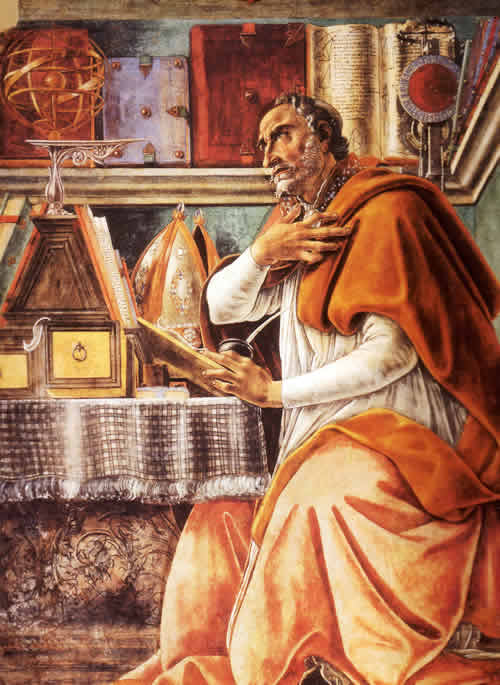Saint Augustine never thought of becoming a priest. After receiving the waters of baptism from the hands of Saint Ambrose on the paschal of vigil of 387 AD ( in Milan, they were following the Alexandrian calendar. Thus, Augustine must have been baptized within April 24 and 25: Vita 1), his only desire was to return to his birthplace to establish there a community of monks, following the models of communities, which he had come to know in the same city of Milan and later in Rome (mor. 1, 31, 67). And this dream was realized in the year 388 AD, when, after the death of his mother Monica, Saint Augustine was able to return to North Africa. He settled in Tagaste with a group of friends, and there founded a monastery.
Monastic Life
At that moment, his only dream was to live as a monk, or as the same Augustine says in his Letter 10 addressed to his dear and ill-fated friend, Nebridius, using the a phrase of the classical Latin world that he only wanted: “deificari (…) in otium” (ep 10, 2), which means to be filled with God, to be deified in the life of otium sanctum, that is to say, in the life of contemplation and praise of God, manual and intellectual work and community life. Nevertheless, the plans of God were not the plans of Saint Augustine.
At the end of 390 AD or at the beginning of 391 AD, Saint Augustine went to Hippo. It was trip the will definitely mark his life, and the life and history of the West as well. His plan was to found a new monastery in that maritime city (Hippo was considered to be the second most important port of North Africa at that time) and also he wanted to speak with a friend ( for Saint Possidius, he is an agens in rebus, a member of the imperial police who longs to speak with Augustine: Vita 3), whom he wanted to invite to live with them in the monastery (s. 355, 2).
It is necessary to say that Saint Augustine never ceased to be a monk. Even though, he received Holy Order and later Episcopal ordination, he never set aside the life of a monk. Neither did he stop in founding monasteries nor in living in community with his clergy when he would become a bishop. Having known Augustine’s desire, bishop Valerius gave Augustine a garden, which was a property of the Church of Hippo where Augustine could found a monastery for non-clerical monks (Vita 5).
Priest by acclamation
Saint Augustine went to Hippo and talked with this friend. One day, Saint Augustine, with all his innocence, attended the celebration of the Eucharist. In that celebration, the bishop of Hippo, the old Valerius, who was of Greek origin and did not have a good command of the Latin language, spoke to the people of Hippo saying that he was already old and he spoke Latin badly that he needed the help of a priest who would help him in the pastoral care of the diocese of Hippo (one of the biggest dioceses of North Africa if not the biggest). At that moment, the eyes of those present were fixed at Saint Augustine. They had heard of his life before as a Manichaean, his conversion and sanctity of life. As a result, the people at that moment saw in Augustine more than enough solution to the needs of Valerius. Thus, they started to shout, asking for Augustine’s ordination to the priesthood. (At the time of Saint Augustine, this was the normal procedure. The election of God’s ministers is done by acclamation). Before he knew it, Augustine was surrounded by the people and he was brought before Valerius (s. 355, 2; Vita 4). Saint Augustine was not able to say no: thus, he was ordained priest.
Gratifying Service
Saint Augustine was ordained priest most probably at the end of January 391. At that point, Augustine asks bishop Valerius to grant him some time before Easter, to prepare himself for his priestly ministry (Ep. 21). Saint Augustine was aware of the great responsibility entailed by his priesthood. For this reason, he wants to prepare himself, most especially in the study of the Sacred Scriptures. Thus, in his letter 21, Saint Augustine expresses to Valerius this great responsibility when priesthood is desired to do the plans of God, and that which is pleasing that brings about the diaconal, presbyteral and Episcopal ministry, when it is only sought for vanity or mundane interests. Thus, Saint Augustine says:
“(…) in this life, and especially at this time, nothing is easier, more pleasant, and more attractive for men that the office of bishop, priest or deacon, if the task is carried out perfunctorily or in a self-serving manner, but that before God, nothing is more miserable, more sad, and more worthy of condemnation. Likewise, nothing in this life, and especially at this time, is more difficult, more laborious and more dangerous than the office of a bishop, priest or deacon. But before God, nothing is more blessed if one soldiers as our Emperor commands. (Ep. 21)
Three Characteristics
Augustine’s priesthood was marked not only by the foundation of a new monastic community, but also by the brilliant exposition of the Symbol of faith that he made before the bishops of North Africa, gathered in a local synod in the year 393 in the Secretarium of the basilica of Hippo. Such was the impression that this Augustinian exposition moved the bishops to ask Augustine to put it into writing that they may bring and expose it to their faithful. Saint Augustine, as a priest, then wrote the so-called De Fide et Simbolo.
A second element that needs to take into consideration is his polemics with heretics. In the year 392, by the petition of both Catholics and Donatists, Augustine faces Fortunatus, the Manichaean in the thermal of Sossius. At the end of the debate, Fortunatus loses and later decides to leave the city. The proceedings of the debate are recorded in Contra Fortunatum.
A third important element of Saint Augustine as priest is the preaching of the people. At the time of Saint Augustine, this was a work proper of a bishop. Nevertheless, Valerius delegated this task to Saint Augsutine, not only because the same Valerius did not have a good command of the Latin language, but also because Saint Augustine was a professional rhetorician and a true teacher of oratory. For this reason, one of the tasks that will take part of Saint Augustine’s pastoral ministry, will be the preaching to the people. He will have to preach when he would be a priest and later as a bishop. His preaching was generally an explanation of the Word of God, since Augustinian theology is no other than an elaboration of Biblical doctrine.
Daily Mass
Next to preaching is the quotidian celebration of the Eucharist. It is something usual in the Church at the time of Augustine. Although it is true that each region had their proper practices, we know, through Augustinian sermons, especially Sermon 227, that the Eucharist was celebrated in Hippo. It speaks of the reception of the body of Christ “everyday.” Thus, Saint Augustine, a priest was celebrating the Eucharist for the faithful everyday, recognizing the necessity that both faithful and pastors have the need of the sacrament that gives life: “From it, we also live, as we are your co-servants.” (s. 229 E, 4)
In view of these two roles that make up the life and ministry of the priest, Saint Augustine will define the priest as the dispensator verbi et sacramenti (c.litt. Pet. 3, 67), the minister, the administrator who, in the name of God, serves his brothers, the same word of God and the sacraments, in a very special way, the sacrament of the Eucharist.


